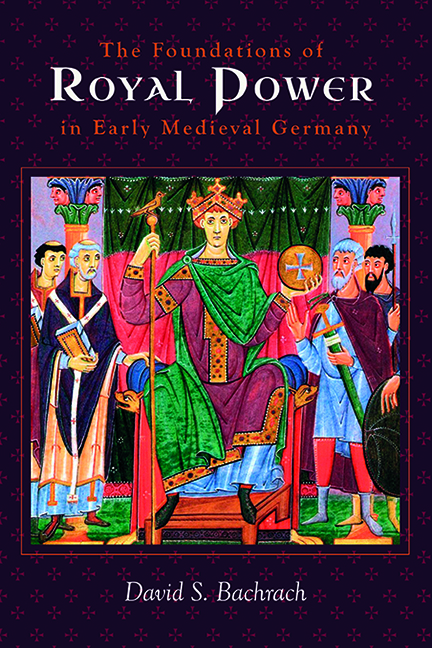 The Foundations of Royal Power in Early Medieval Germany
The Foundations of Royal Power in Early Medieval Germany Book contents
- Frontmatter
- Dedication
- Contents
- List of Illustrations
- Acknowledgments
- List of Abbreviations
- Maps
- Introduction
- 1 The Economy of Carolingian East Francia and Ottonian Germany
- 2 Material Assets of the Royal Fisc
- 3 Taxes, Tolls, and Other Regalian Rights
- 4 Ecclesiastical Resources at the Ruler’s Disposal
- 5 Toward an Analysis of Royal Expenditures: The Iter Regis and the Cost of Defense
- Conclusion
- Appendix 1 Fiscal Properties held by the Rulers of East Francia and Germany, 887–1106
- Appendix 2 Fortifications held by the Royal Government during the Reigns of Henry I and Otto I
- List of Key Terms
- List of Key Dates
- Bibliography
- Index
2 - Material Assets of the Royal Fisc
Published online by Cambridge University Press: 16 July 2022
- Frontmatter
- Dedication
- Contents
- List of Illustrations
- Acknowledgments
- List of Abbreviations
- Maps
- Introduction
- 1 The Economy of Carolingian East Francia and Ottonian Germany
- 2 Material Assets of the Royal Fisc
- 3 Taxes, Tolls, and Other Regalian Rights
- 4 Ecclesiastical Resources at the Ruler’s Disposal
- 5 Toward an Analysis of Royal Expenditures: The Iter Regis and the Cost of Defense
- Conclusion
- Appendix 1 Fiscal Properties held by the Rulers of East Francia and Germany, 887–1106
- Appendix 2 Fortifications held by the Royal Government during the Reigns of Henry I and Otto I
- List of Key Terms
- List of Key Dates
- Bibliography
- Index
Summary
As had been true of the Carolingian Empire under Charlemagne and Louis the Pious, the rulers of Carolingian East Francia and their Ottonian successors drew upon a wide matrix of material resources to sustain their rule. These material assets were organized by both the Carolingians and Ottonians in fiscal units usually denoted as villae, although there was considerable variation in the ways that royal and imperial officials discussed landed properties. These estates comprised a bewildering array of economic resources, including farmland, vineyards, stud farms, stock farms with associated meadows for grazing, fisheries, quarries, industrial and mining facilities of the type discussed in the previous chapter, urban rental properties, woodlands, and also hunting preserves. The real assets of the crown also included large numbers of royal palaces, which often also possessed substantial economic elements such as craft and industrial centers, again of the type discussed in the previous chapter.
At any one time, a substantial portion of these real material assets was held directly by the royal fisc under the direct supervision of the king's agents. Another substantial and variable portion of the fisc was granted out as beneficia for a wide range of purposes. These beneficia, in turn, can be divided between those in which real assets were transferred into the hands of the benefice holder to be managed directly by the recipient, and those in which the benefice holder received the revenues drawn from fiscal assets, in a manner analogous to “money-fiefs” of the high Middle Ages.
Contrary to much of the speculation by scholars on this point, the fiscal resources granted out by the East Frankish and Ottonian rulers as benefices, as a rule, were not lost to the government but rather were recovered and reused for other purposes once the original grant had runs its course. Moreover, as discussed in the introduction to this volume, it is also a category error to think of fiscal assets granted as beneficia as being lost to the government even during the period in which they were the hands of royal fideles. The government granted these fiscal assets to achieve specific ends, such as providing the resources that office holders required to carry out their duties. So long as the recipients of the benefices carried out their duties, the ruler continued to gain benefit from the assets granted out, on a temporary basis, from the fisc.
- Type
- Chapter
- Information
- The Foundations of Royal Power in Early Medieval GermanyMaterial Resources and Governmental Administration in a Carolingian Successor State, pp. 67 - 120Publisher: Boydell & BrewerPrint publication year: 2022


